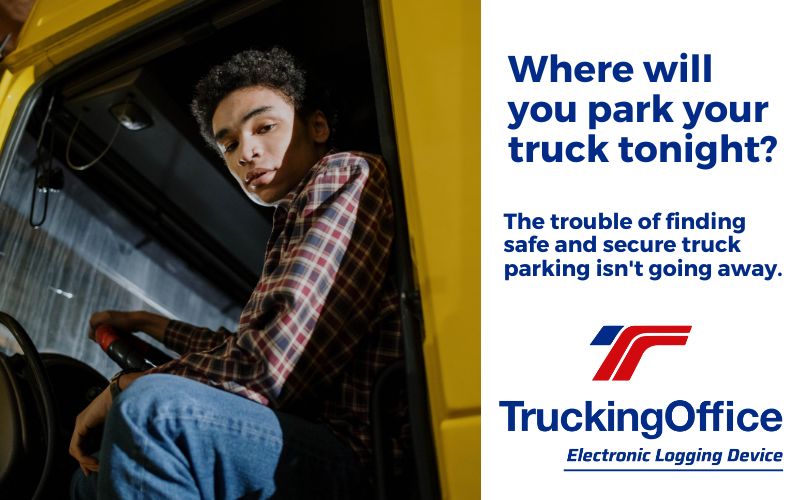Where are you going to park your truck tonight? TruckingOffice want to to know.
Finding a safe place to park your truck remains a huge priority for truckers. Priority? How about major challenge everyday we’re on the road. Figuring out where you’re going to park your truck affects 90% of drivers according to a 2020 survey. The US DOT and Federal Highway Administration’s report had statistics that every long-distance trucker already knows: it’s hard to park your truck safely.
HOS, ELD and Truckers
With the hours of service (HOS) limits on truckers, finding a place to park your truck becomes extra complex. After 14 hours on the road, there’s no guarantee you’re going to find a place near to your route or close your destination. Some truckers have said that they start looking for truck parking up to 2 hours before the end of their day. Often they don’t find a place and end up on the side of the road on a ramp with no services for truckers.
Why do we have this problem?
NIMBY: Not in My Backyard. Communities don’t want truck stops. Truck stops are seen as dirty, attractive to criminials and sex workers. Or people in communities believe the value of their property is at risk if a truck stop is too close by. I was watching a local affluent community manage to stop the development of an ideal location of a truck stop within 10 miles of four major interstates in northeastern Ohio. The NIMBY was strong. The development company caved. They eliminated 20% of the planned truck parking, the trucker’s showers, and the scales from the property. A trucker could buy fuel and a sandwich. SMH.
Environmental Issues: For some people, the risk of damage to the environment is more important than the truckers’ needs for a safe and healthy place to rest – as long as these people can get their stuff delivered. People who think that diesel trucks are bad for the environment want electric trucks. (Where do they think the electricity is going to come from?)
When will they figure out that the more we have to drive off our routes, the more pollution is created? Having more good places to park will actually reduce our exhaust and impact on the environment.
In the end, I believe that people just don’t think.
How do they think they get clothes on their backs, buildings to live in, and food to eat? Trucking isn’t the backbone of the US, it’s the skeleton that keeps us functional. And truckers deserve to be treated with respect and given access to clean and safe locations to rest.
That would be a lot more useful in reducing trucking accidents than putting speed limiters on 18-wheelers.
Personal Conveyance
Because of the HOS and the electronic log book for drivers requirements, truckers often have to resort to driving off-duty to find a suitable place to park. The purpose of Personal Conveyance allows a trucker to drive their rig off duty for their personal needs. The DOT says that this driving is for the convenience of the trucker, not for moving the freight, even though the trailer with the load is still attached to the cab when the trucker is driving.
Yeah, that’s clear. Clear like mud.
A trucker can drive off-duty to go to a hotel or store. But what if that’s in the direction of the delivery?
And how would the DOT know? The ELD records are marked that the driver is driving, off-duty. (In the TruckingOffice ELD, it’s a button on the screen.) Can an auditor or law officer question if the trucker happens to be going in the same direction to park your truck as you are to deliver a load?
Sounds like an ideal situation for malicious compliance, doesn’t it? “Yes, officer, I’ve maxed out my HOS, but I’m heading for a place to park in the same direction as my delivery. It’s a complete coincidence.”
What Can Communities Do?
Allen Campbell, our fearless leader and founder, sent a link to a recent article about truck parking.
Since we live in northeastern Ohio, we have
- 8 US interstate highways (10 if we include Columbus)
- 5 US Route highways (There are probably more, that’s just what I counted off the top of my head)
- dozens of Ohio State Routes 4 lane highways
And a LOT of trucks.
We also have some major cities with major league sports arenas. (We have the Cleveland Browns. Be kind.)
This article makes a great point. Those arenas are used on an infrequent basis. It’s not like the Browns Stadium has a lot of off-season use, other than an infrequent summer rock concert. The same for the Cleveland Indians Guardians and the Cleveland Cavaliers. Those parking lots are often secured with fencing to keep undesirable rodents or miscreants out. Why not use those for truck parking?
Frankly, my taxes built those arenas. Charging a minimal amount for safe trucking parking to offset those costs makes good sense to me. It’s a win for truckers and a win for the community.
You Need to Park Your Truck
The trucking industry has a bad reputation, and it’s not always our fault. Don’t you think that people should recognize that everything in their life is there because a trucker delivered it?
Maybe we need a better PR company to help people understand the need for truck parking in their communities.
Right now, every trucker needs a safe and secure place to park your truck tonight.
What do you think? Where will you park your truck tonight? Leave us a comment and tell us!
How did you find that spot? Did you use an app? Did you feel safe?







Trackbacks/Pingbacks